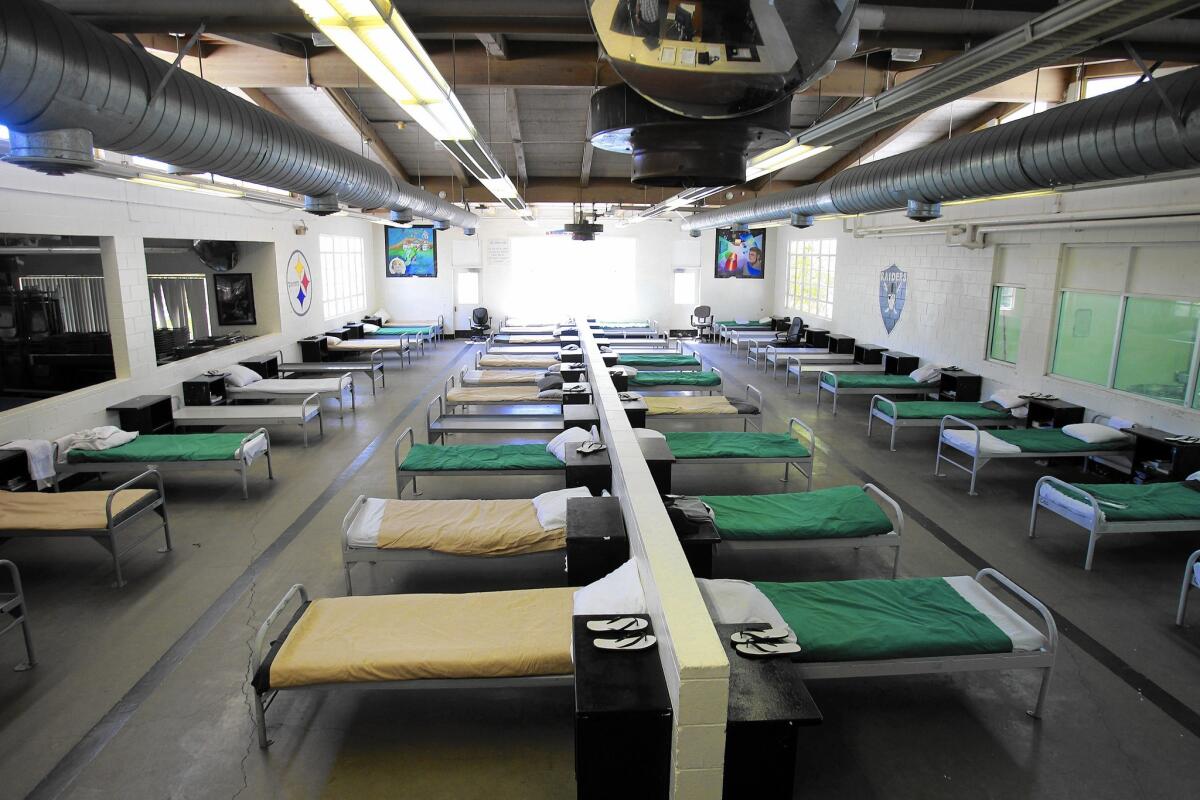Editorial: Time for accountability in L.A. County juvenile justice

- Share via
There are several reasons why Los Angeles County’s juvenile justice system is such a mess, with so many young people coming out of juvenile halls and probation camps even more broken than they were when they went in.
One reason is that when the U.S. Dept. of Justice swooped in more than a decade ago to examine the dysfunction — excessive force in the halls and camps, emotional abuse, sexual assault, poor education, overuse of pepper spray, deficient mental health treatment — the county made enough promises to stave off a federal consent decree. In retrospect, it would have been better had a decree been imposed and the feds stuck around, because the same problems persist today.
Another reason is that the county’s programs for rehabilitating and caring for young offenders is part of the same, massive Probation Department that supervises adults after they’ve left jail or prison. By state law as well as common sense, the rehabilitative and restorative mission of juvenile justice is different from the punitive mission of the adult system. The two approaches need different employees, different training, different supervision and different organizational cultures.
Yet another reason is a revolving door of leadership, with L.A. County’s chief probation officer leaving, on average, every other year. Current Chief Probation Officer Terri McDonald recently announced her retirement, to take effect in several months.
And still another reason is an oversight body that has lacked both independence and the attention and respect of the Board of Supervisors.
Nothing can be done now to get the Justice Department back. Under the Trump administration it has given up its role in getting local justice agencies on track.
But the Board of Supervisors, after a half-dozen or so reexaminations by various consultants, work groups and commissions, now has a rare opportunity to make sweeping improvements.
On Tuesday it will decide whether to move forward with a new oversight body that at last would be independent of the department, with its own staff and with power to examine documents, budgets and data.
That’s not just some bureaucratic tweak. No organization, and especially no government agency, can properly spend the public’s money and effectively fulfill its mission when it is accountable to no one but itself. The nine-member Probation Oversight Commission proposed by Supervisors Mark Ridley-Thomas and Hilda Solis is the right way to go.
The board would be wise to ensure that the new body has sufficient staff and funding to be effective. Nothing is more wasteful than government boards that sport the trappings, but lack the substance, of oversight.
The design of the new commission emerged from the numerous hearings, studies and deliberations by a reform panel that filed its recommendations over the summer.
The panel also advised splitting the Probation Department by removing the juvenile justice function and redesigning it as a health-and-care-oriented program. That’s the right move too, and is in line with positions first articulated by this page four years ago and more emphatically in June. And to their credit, the supervisors have been receptive; last month they took steps to create a new health-oriented juvenile justice agency.
Once it’s up and running, that new agency will have its hands full. The Probation Department’s marquee project — a costly but promising juvenile rehabilitation facility in the Malibu hills known as Campus Kilpatrick, and an accompanying set of rehabilitation programs — is in deep trouble.
The county’s maddening contracting process delayed an essential study aimed at measuring the effectiveness of Kilpatrick’s small-group treatment approach rather than the traditional boot-camp model. Meanwhile, the county’s appropriate decision to close other camps (to account for a drastically reduced population of juveniles in custody) forced Kilpatrick to take on numerous youths who were too mentally ill to benefit from the program. The education program lagged. The camp had too few mental health and special education staff on hand. And then came last year’s destructive Woolsey fire, requiring Kilpatrick to be evacuated and, at least for now, closed.
In the short term, the Board of Supervisors has to consider whether it’s better to replace McDonald with a single new chief probation officer to preside over the breakup of the department, or to appoint one leader for a separate adult department and another for youth services. But above all, it has to keep its focus on probation sharp enough to ensure that it’s finally creating a system that effectively puts troubled juveniles and wayward adults on the right track — and not just another sedimentary layer of bureaucracy.
More to Read
A cure for the common opinion
Get thought-provoking perspectives with our weekly newsletter.
You may occasionally receive promotional content from the Los Angeles Times.










